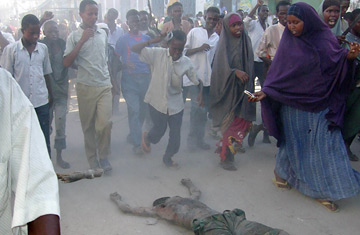
A crowd of Somalis beat the body of an Ethiopian soldier as it is dragged in the streets of Somalia's capital.
It was still possible, this summer, to see some hope in Somalia. The country was in dire need of some. The Ethiopian army, which invaded last December, had killed thousands of Somalis and lost thousands of its own in some of the fiercest fighting that the capital, Mogadishu, had seen in 16 years of civil war. There was also an acute and mounting humanitarian crisis, as hundreds of thousands of refugees fled the capital for makeshift camps in the desert. But an August lull in the fighting allowed Ethiopian Prime Minister Meles Zenawi to claim violence was ending. And Washington, which sent a small number of U.S. Special Operations troops to accompany the invasion, was optimistic that the government the Ethiopians installed — the Transitional Federal Government (T.F.G.) — would make progress towards national reconciliation. If that could be accomplished, the U.N. and other agencies might feel safe enough to restart the substantive humanitarian assistance Somalia required. International business, led by enterprising Chinese telecom investors, was even probing Somalia's financial prospects. Might Somalia, left to fester in bloody chaos for so long, finally be rejoining the world?
That hope has now evaporated. In October, the T.F.G.'s inability to rise above tribal rivalries was laid bare when internal feuds culminated in President Yusuf Abdullah's firing of his Prime Minister, Ali Mohammed Gedi. This month, fighting between Ethiopian troops and Somali insurgents again erupted in Mogadishu, prompting tens more thousands of refugees to desert the capital. In scenes reminiscent of the 1993 battle between U.S. troops and a Somali militia, the bodies of two dead Ethiopian soldiers were dragged through the streets.
Somalia is once again the war no one wants to touch. Ethiopia is discovering, as the U.S. has in Iraq, that invasion and occupation are two different things. It is stuck fast in its own East African quagmire, reluctant to stay yet unable to withdraw. This month, in response to a Security Council request, U.N. Secretary General Ban Ki-Moon said sending in a U.N. peacekeeping force was "neither realistic, nor viable" and — appropriating the White House's language — suggested the formation a multinational "coalition of the willing." Ban knows full well that no one is willing. The African Union, which promised 8,000 peacekeepers, has supplied just 1,600 Ugandan troops. And the recurrent image of bodies in the street discourages anyone else from stepping forward.
Why does this matter? There are two immediate reasons. The humanitarian crisis unfolding in Somalia is now on a par, in numbers and acuteness, with Darfur. The U.N. says 1.5 million people need assistance, of which a mere 60,000 are getting it. And Somalia is of significant strategic interest. Pirates based there regularly strike ships heading to and from the Suez Canal, and attacks have rocketed this year. The conflict in Somalia — which pits Ethiopian and T.F.G. troops against Somali rebels, backed by Eritrea — also has the potential to ignite a larger regional war that engulfs the Horn of Africa. Last week, Ban Ki-Moon expressed serious concern about the military buildup along the Eritrea-Ethiopia border, while State Department spokesman Sean McCormack urged Eritrea and Ethiopia to pull back troops from key border areas and use "maximum restraint" to avert a new war.
Most important for the U.S., Somalia has wider international ramifications for terrorism. It has been a home to al-Qaeda-funded Islamist radicals since the early 1990s. The Ethiopians invaded to topple the Union of Islamic Courts (U.I.C.), which had ruled Mogadishu for six months and whose leader declared a jihad on Ethiopian troops then operating inside Somalia. According to insurgents I spoke to this summer in Mogadishu, U.S. intervention alongside Ethiopian forces — U.S. warplanes carried out at least two strikes on suspected Islamists in the south of the country in January, and a warship unleashed an artillery barrage on another group in the north of the country in June — radicalized the Somali insurgency further.
U.S. generals frequently refer to Somalia as the "third front in the war on terror." Hundreds of foreign Islamist fighters are heeding calls from Osama bin Laden to go fight in Somalia, according to analysts in the region. And militant leader Aden Hashi Ayro, wounded in the January strikes, has now recovered and is leading a reconstituted and overtly anti-American U.I.C. rebellion in Mogadishu. There is little question that such dire assessments are becoming increasingly accurate.
